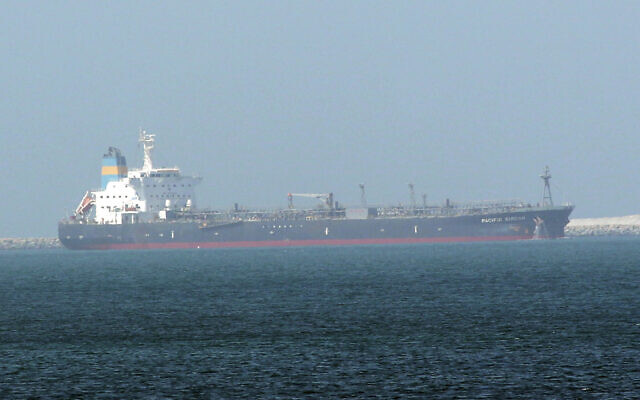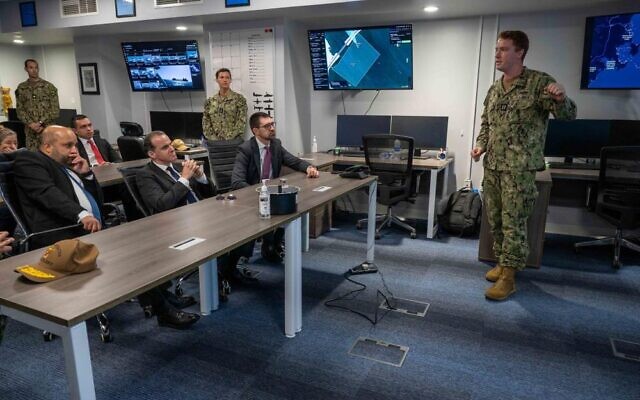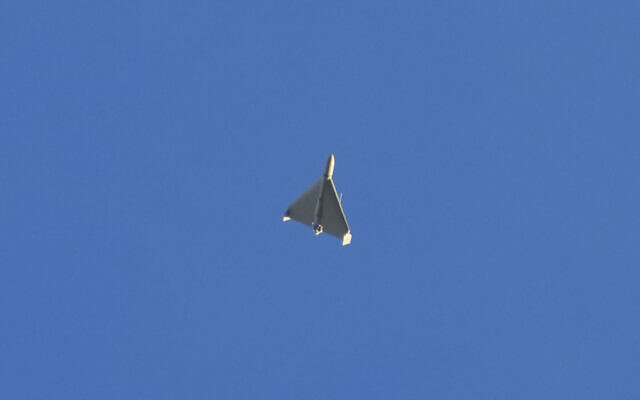US Navy investigators on Tuesday confirmed an explosive-laden drone that struck an oil tanker associated with an Israeli billionaire off the coast of Oman last week was an Iranian Shahed-136.
The “suicide drone” attack on the Liberian-flagged oil tanker Pacific Zircon on November 15 appeared to be part of a long-running shadow war between Israel and Iran that has included the targeting of Israeli-linked ships around the region.
Western and Israeli officials said the recent attack, which caused damage but no injuries, was launched from an Islamic Revolutionary Guard Corps base in the southeastern Iranian city of Chabahar.
The US Navy said explosives experts boarded the ship to assess the damage, including a 76-centimeter-wide (30-inch) hole punched in its side, and to collect debris and bomb residue.
The evidence was analyzed at a lab at the US Fifth Fleet headquarters in Bahrain and identified as a Shahed-136, the US Navy said.
Get The Times of Israel's Daily Edition by email and never miss our top stories
Iran has supplied the same model of drones to Russia, which has been using them to target infrastructure and civilian targets in Ukraine.

Liberian-flagged oil tanker Pacific Zircon, operated by Singapore-based Eastern Pacific Shipping in Jebel Ali port, in Dubai, United Arab Emirates, on August 16, 2015. (AP Photo/Nabeel Hashmi)
“The Iranian attack on a commercial tanker transiting international waters was deliberate, flagrant and dangerous, endangering the lives of the ship’s crew and destabilizing maritime security in the Middle East,” said Vice Adm. Brad Cooper, commander of US Naval Forces Central Command.
Pacific Zircon is operated by Singapore-based Eastern Pacific Shipping, ultimately owned by Israeli billionaire Idan Ofer. Israeli and American officials said at the time of the attack that they suspected Iran was behind it.
Iranian officials have not commented on the attack or allegations that Iran was involved.
On Sunday, Israel’s National Security Adviser Eyal Hulata visited the fleet’s headquarters and received a briefing from Cooper and other US Navy officials.

Lt. Jesse Faylo briefs Eyal Hulata, Israel’s National Security Advisor and Head of the National Security Council, left; Brett McGurk, U.S. National Security Council coordinator for the Middle East and North Africa, center left; and other officials inside Task Force 59’s Robotics Operations Center in Bahrain, Nov. 20. (US Navy photo by Mass Communication Specialist 1st Class Mark Thomas Mahmod)
Tehran and Israel have been engaged in a years-long shadow war in the wider Middle East, with some drone attacks targeting Israeli-associated vessels traveling in strategic waterways in the Middle East.
In one such attack in July 2021, Mercer Street, an oil tanker owned by an Israeli businessman, was struck by a Shahed drone, killing two crew members.
In November of that year, Defense Minister Benny Gantz revealed the locations of two Iranian drone bases that he said were used to conduct attacks against targets at sea, including the one at Chabahar.
The US also blamed Iran for a series of attacks occurring off the coast of the United Arab Emirates in 2019. Tehran at the time had begun escalating its nuclear program following the United States’ unilateral withdrawal from its atomic deal with world powers.

A Shahed-136 drone is seen in the sky seconds before it hit buildings in Kyiv, Ukraine, October 17, 2022. (AP Photo/Efrem Lukatsky)
Since the collapse of Iran’s nuclear deal, nonproliferation experts warn, the Islamic Republic has enough enriched uranium to make at least one nuclear weapon if it chose, though Tehran insists its program is peaceful.
Iran also has been lashing out at its perceived enemies abroad amid monthslong nationwide protests now challenging its theocracy.
The oil tanker attack also came just days ahead of the FIFA World Cup in Qatar.
The head of Military Intelligence on Monday said Iran was mulling an attack on the World Cup in Qatar, as it faces increasing pressure at home amid the anti-regime protests.
Outgoing Defense Minister Benny Gantz also warned that Iran is liable to attack the World Cup in order to cause regional instability.
An Israeli official speaking on condition of anonymity linked the drone attack to the World Cup, saying, “Iran undermines security in the Gulf and, along the way, undermines stability during the World Cup.”
The Associated Press contributed to this report.


